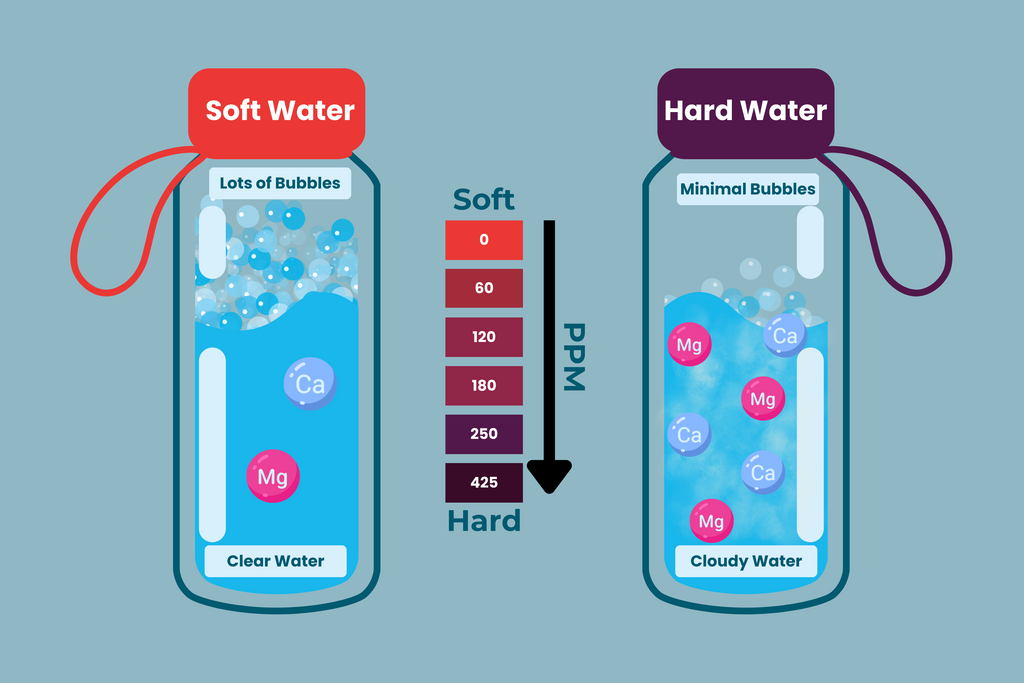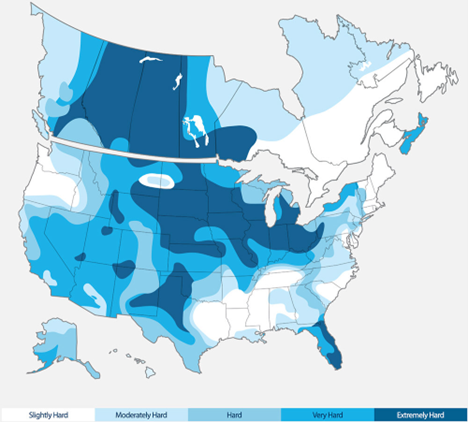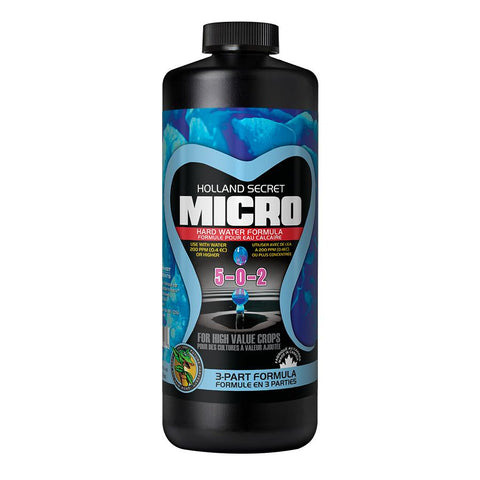Growing with Hard Water Micro

Do you find yourself battling with hard water in your garden but aren't quite sure what makes water "hard" or "soft" in the first place? Worry not! We've got the scoop and the solution for you.
The Hard Water Conundrum in Cannabis Cultivation
What exactly is hard water? Simply put, it's water that's rich in minerals like calcium and magnesium. While these minerals don't pose health risks, they can be quite the hurdle for cannabis growers. The good news is, with the recent exit of a competitor's hard water product from the market, the spotlight is now on our Holland Secret Micro for Hard Water – your new go-to ally in the fight against hard water challenges. This guide will not only help you understand hard water but will also introduce you to how our specially formulated product can turn your growing pains into gains.

Understanding and Testing for Hard Water versus Soft Water
Water's hardness is determined by its mineral content, primarily calcium and magnesium. Hard water, with a PPM (parts per million) over 200, can challenge cannabis cultivation by causing nutrient lockout and inhibiting growth. Soft water, conversely, has lower levels of these minerals but might contain higher sodium, affecting plant health differently.
How to Identify Your Water Type
Annual Water Quality Reports: Your local water supplier's report can inform you about your water's hardness. If hardness levels aren't listed, contact them directly for this information.
To check the GPG index of your city’s water, visit Aquatell
In-Home Soap Test: Mix tap water with a few drops of pure liquid soap in a clean bottle. Hard water will produce minimal suds and appear cloudy, whereas soft water results in abundant suds and clear water at the bottom.
Hard Water Test Kits: Available at home improvement stores, these kits use test strips and a color chart for a more precise hardness measurement. Dip the strip in water, then compare its color change to the chart to determine hardness.
Water Analysis Equipment is available at BetterThanNature.
TDS Meter and Colorimeters: For immediate readings, a TDS meter can be used. Colorimeters offer a sophisticated analysis by measuring the light absorbed by water, correlating directly with mineral concentration.
Key Thresholds
| Hardness Level | mg/L (or PPM) | Grains per Gallon (GPG) | SI (mg/L) |
| Soft | 0 - 60 | 0 - 3.5 | 0 - 60 |
| Moderately Hard | 61 - 120 | 3.6 - 7.0 | 61 - 120 |
| Hard | 121 - 180 | 7.1 - 10.5 | 121 - 180 |
| Very Hard | 181 - 240 | 10.6 - 14.0 | 181 - 240 |
| Extremely Hard | 241+ | 14.1+ | 241+ |
If your water hardness reading is 200 ppm or more, it's recommended to
use Holland Secret Micro Hard Water for optimal plant health and growth.
Geographical Insights
An astonishing 85% of US households are affected by hard water to some degree.
- United States: Cities like Phoenix and San Antonio report hard to very hard water levels, with Phoenix water hardness ranging from 170 to 284 mg/L and San Antonio at a staggering 305 mg/L, making these areas particularly challenging for cannabis growers.
- Canada: Toronto and Montreal show moderately hard water with levels around 111 mg/L and 117 mg/L, respectively, indicating a need for growers in these cities to consider water quality management strategies.
For more detailed insights into water hardness and its impact, visit Ancient Warmth.
Growing with Hard Water
Growing cannabis with hard water presents unique challenges due to its high mineral content, particularly calcium and magnesium, which can disrupt the nutrient uptake of plants. This condition often leads to nutrient lockout, where plants cannot absorb essential nutrients efficiently, affecting their health and growth.
When growing cannabis with hard water, it's important to adjust your nutrient mix to counteract the high levels of calcium and magnesium. One effective strategy is to reduce phosphate (PK) supplements by approximately 20%, which can help prevent nutrient lockout, ensuring plants can efficiently absorb essential nutrients.
Growing with Hard Water Micro
Given the challenges posed by hard water, the importance of choosing the right nutrient solution cannot be overstated. Holland Secret Micro for Hard Water is tailored to address these specific challenges, reducing the excess calcium and magnesium's impact, and preventing nutrient lockout.
Advantages of Holland Secret Micro for Hard Water
- Formulation: It's designed to work seamlessly with hard water, compensating for its high mineral content without overwhelming your plants.
- Nutrient Absorption: By mitigating the effects of excess calcium, it ensures that your cannabis plants can absorb the full spectrum of essential nutrients they need.
- Flexibility: Ideal for water with PPM readings over 200, it's a versatile solution that adapts to varying degrees of water hardness.
Using Holland Secret Micro for Hard Water is straightforward. Begin by testing your water to determine its hardness. If your PPM is over 200, Holland Secret Micro for Hard Water should be your go-to. Mix it according to the instructions for your specific water hardness level, ensuring that your plants receive a balanced nutrient mix, tailored to overcome the challenges of hard water.
For those who previously relied on General Hydroponics’ FloraMicro Hardwater,
Holland Secret Micro Hard Water presents an excellent alternative. It seamlessly fits into your existing nutrient regimen, addressing hard water challenges with precision. This switch not only offers a solution to the discontinuation but also introduces advanced benefits for an ideally balanced growing environment, ensuring your cannabis cultivation thrives.
Growing with Very Hard Water
When Holland Secret Micro Hard Water alone doesn't bring PPM to desired levels, adding Reverse Osmosis (RO) water can help. RO water, stripped of up to 99% of salts and contaminants, needs remineralization to ensure cannabis gets necessary nutrients, as it lacks minerals essential for growth. While RO water doesn't remove certain substances like some pesticides and metals, supplementing with products like Calnesium or Organical Magic can prevent common deficiencies, making RO water a safe and effective option for cannabis cultivation.
Hard Water FAQs
Hard water contains high levels of minerals, primarily calcium and magnesium, affecting nutrient uptake in cannabis plants.
Excess minerals in hard water can lead to nutrient lockout, preventing essential nutrient absorption by the plants.
Signs include mineral buildup on fixtures, or use a TDS meter to measure water PPM. Over 200 PPM indicates hard water.
Yes, through water softeners, reverse osmosis systems, or specific nutrients like Holland Secret Micro Hard Water.
A nutrient solution designed for hard water to help cannabis plants efficiently absorb nutrients despite high mineral content.
If PPM is over 350, it's recommended to skip additional Cal-Mag supplements to avoid nutrient overload.
Consider integrating Reverse Osmosis (RO) water to further reduce mineral content for optimal plant growth.
Reducing PK supplements by about 20% can help manage nutrient balance and prevent potential toxicity or lockout.
Hard water is also known as mineralized water, calcium-rich water, lime-rich water, and magnesium-rich water, highlighting its high mineral content.
The best alternative to FloraMicro Hardwater is Holland Secret Micro Hard Water, formulated to support cannabis cultivation in hard water conditions for optimal nutrient absorption and plant health.




5 comments
I live in Manitoba and my water hardness is over 50 and my PPM is around 1100. I had to put the water through a water softener and then through a reverse osmosis system to get my water down to about 110. There is no salt in the reverse osmosis water as far as I can tell and my plants are exploding with growth. Would highly recommend the two-step approach for really hard water it works well.
Hey John,
Thank you for sharing your concerns about the white calcium deposits in your hydroponic system. It seems like the issue could be related to the nutrient balance, particularly an excess of phosphorus. Since lettuce requires lower phosphorus levels, adjusting your nutrient mix might help. Here are some steps you can take:
Ensure Proper Mixing of Nutrients: Make sure all nutrients are thoroughly mixed in the reservoir to prevent imbalances.
Adjust Nutrient Ratios: Consider reducing the phosphorus content in your nutrient solution, focusing on a blend more suitable for lettuce.
Regular Monitoring: Keep an eye on the pH and EC levels in your system, as these can impact nutrient uptake and contribute to scaling.
Continue System Maintenance: Regular cleaning of tanks and jets is crucial to prevent residue buildup.
We hope these suggestions help in addressing the issue. If you have any further questions or need more guidance, feel free to reach out.
We have hard water. It cloged the jets. I had to remove all the jets and some them in vinegar and water. We replaced the water with reverse osmosis and we still have white calcium on the metal trays and on the holding tanks. We planted 32 of the 64 pods we have 5 lettuce plants growing.any suggestions.
Hi Craig,
You should be good to use our entire line with just the Hard Water Micro. If your PPMs are over 350 then we recommend you stop using Calnesium.
I live in Dawson Creek and yes we have hard water I’m using the hard water micro in your product line is there any other things I should be tweeking in using the full product line